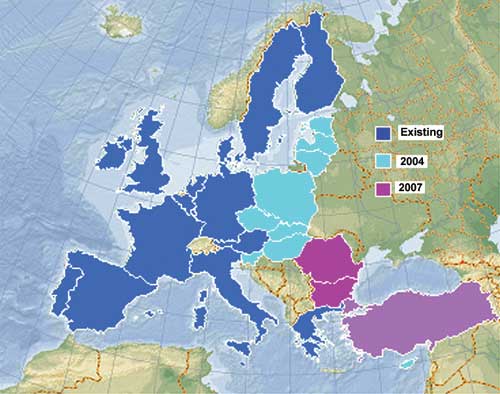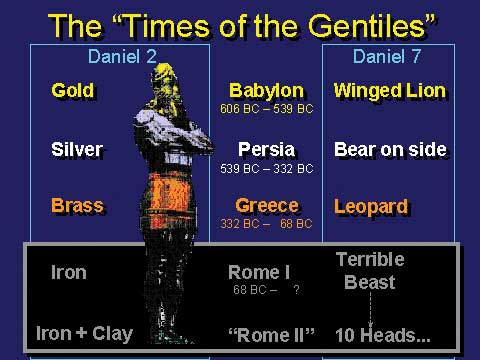For 19 centuries Bible scholars have been anticipating a "Revived Roman Empire." Many wonder where this strange expectation comes from. Is this some kind of academic fantasy, or is there a real basis for this quaint perspective?
There are also some that suspect that the current expansion of the European Union may be setting the stage for the emergence of that final world empire which will initiate the final scenario climaxing with the Second Coming of Christ. Will this emergent federation of states ultimately become the domain of that coming world ruler that many call "the Antichrist"? Is he alive today?
The strategic geopolitical horizon of past half-century has been dominated by two superpowers: the United States and the USSR. But it is becoming clear that the two dominant powers of the next half-century apparently will be China in the east and the "new Europe" in the west.
The United States has a population of approximately 270 million. The new Europe is over 57% larger, with a combined population of 470 million. If they succeed in establishing a common foreign policy, they will control the United Nations.
As we watched the strange antics of France and Germany during the jockeying of positions in preparations for the war with Iraq, the only way to appreciate what was really going on required the insight that there were more urgent issues at stake than just the Middle East: the power positioning for control of the EU was the primary agenda.
The European Union presently has 15 members. By 2004, ten more will be added. By 2007, two more will be added, with others getting in line.
 These are shown in the following map. Can you name them? (The answers will be included in the next article.) But first things first: where does this expectation for a "Revived Roman Empire" come from? What does the Bible indicate concerning the forthcoming geopolitical horizon? How will it affect the Middle East? NATO? The role of the United States? And how will the emergent changes impact each of us?
These are shown in the following map. Can you name them? (The answers will be included in the next article.) But first things first: where does this expectation for a "Revived Roman Empire" come from? What does the Bible indicate concerning the forthcoming geopolitical horizon? How will it affect the Middle East? NATO? The role of the United States? And how will the emergent changes impact each of us?
The Biblical Background
Generally, the Bible views history - both past and future - through the lens of Israel. But there are a few exceptions. Daniel Chapter 2 and Chapter 7 are distinctive in that they provide a Biblical glimpse of all of world history from Daniel's time during the Babylonian Empire (600 B.C.) until the final climax of human history when God Himself intervenes and establishes His own kingdom upon the earth.
[It is interesting that the portion of the Book of Daniel which focuses on Gentile dominion on the Planet Earth is contained between Chapters 2 through 7, and that in these chapters the original language changes from Hebrew to Aramaic, the Gentile language of that time.]
Nebuchadnezzar, an outstanding general and the son of King Nabopolassar, inherited the kingdom upon his father's death. He had a troubling dream one night, and in seeking its significance he decided to put the court advisors (which he had inherited from his father) to the test. He insisted that they describe the dream he had and then interpret it for him. Of course, they could not. If he would tell them the dream, they would certainly have given their interpretation. They had no way of knowing what he had dreamt. So Nebuchadnezzar ordered them to be executed. (He knew how to reduce excess head count in his organization!)
Daniel had been taken captive as a teenager to be trained at court, and was in that job classification along with his three friends, so they, too, were subject to the same execution order. Daniel petitioned his supervisor for a chance at the challenge, and after a night of prayer, his appearance before the throne of the king is one of the more dramatic episodes in Scripture. Daniel not only described the dream precisely - confirming to the king that Daniel's gift was genuine - and he then also provided the interpretation.
Nebuchadnezzar's Dream
Thou, O king, sawest, and behold a great image. This great image, whose brightness was excellent, stood before thee; and the form thereof was terrible. This image's head was of fine gold, his breast and his arms of silver, his belly and his thighs of brass, His legs of iron, his feet part of iron and part of clay. Thou sawest till that a stone was cut out without hands, which smote the image upon his feet that were of iron and clay, and brake them to pieces. Then was the iron, the clay, the brass, the silver, and the gold, broken to pieces together, and became like the chaff of the summer threshingfloors; and the wind carried them away, that no place was found for them: and the stone that smote the image became a great mountain, and filled the whole earth. This is the dream; and we will tell the interpretation thereof before the king.
Daniel 2:31-36
Strange dream, eh?
Daniel then gives them the interpretation: the series of four metals represent a series of empires. The head of gold represented Nebuchadnezzar, and the kingdom of Babylon. But it would be followed by another, and then another, and then a final one. In the days of the final empire, God Himself would establish His own kingdom with the "stone cut without hands," an allusion to the Messiah who would come to rule. (The consistency of idioms throughout the Bible is, itself, remarkable. The "stone cut without hands" is also" the stone which the builders rejected," the rock of offense," and always speaks of Christ.1)
Notice that there are four metals, with the fourth involving a fragile phase lacking strength due to the inclusion of brittle potter's clay. More on this later. This is where we get the expression, "the idol has clay feet."
Daniel's Vision
 Later in his life, Daniel received a vision of four beasts, which are recorded in Chapter 7. It turns out that while the idioms are quite different from the dream in Chapter 2, the subject is the same: four empires are depicted as summarized in the following diagram. The details in the text are remarkable, and are also later employed in the Book of Revelation.2 Babylon was conquered by Cyrus the Great who established the Persian Empire. After about two centuries, the Persians were conquered by Alexander the Great, whose exploits are further detailed in Daniel 8 and 11. The Greeks were, in turn, conquered by the Romans. But who conquered the Romans? No one. In the fifth century A.D., the western leg of the Roman Empire simply disintegrated into pieces. 3 (The eastern leg of the empire endured another 1000 years before falling to the invasion of the Muslims.)
Later in his life, Daniel received a vision of four beasts, which are recorded in Chapter 7. It turns out that while the idioms are quite different from the dream in Chapter 2, the subject is the same: four empires are depicted as summarized in the following diagram. The details in the text are remarkable, and are also later employed in the Book of Revelation.2 Babylon was conquered by Cyrus the Great who established the Persian Empire. After about two centuries, the Persians were conquered by Alexander the Great, whose exploits are further detailed in Daniel 8 and 11. The Greeks were, in turn, conquered by the Romans. But who conquered the Romans? No one. In the fifth century A.D., the western leg of the Roman Empire simply disintegrated into pieces. 3 (The eastern leg of the empire endured another 1000 years before falling to the invasion of the Muslims.)
Most conservative scholars recognize that the fourth empire will have two "phases": the fragments are destined to reassemble to form the final empire that is so prominent in prophetic Scripture.
It is interesting that each of the "pieces" of the western leg had its "day in the sun," but none of them achieved the dominance of the original: Germany under Charlemagne and the subsequent "Holy Roman Empire." (As Voltaire observed, "It was neither holy, Roman, nor an empire!") Even Hitler suggested a bid for continuance by calling his regime, "The Third Empire." The emerging reassembly of the fragments of the ancient Roman Empire would seem to have profound implications for those who take their Bibles seriously. And there's more.
The Prince That Shall Come
The angel Gabriel visited Daniel and provided him the famed "Seventy Week" prophecy that predicted, among other things, the precise timing of the Messiah presenting Himself as a king to Jerusalem.4 He would then be executed and Jerusalem and the Temple would be destroyed. 5
Jesus gave four disciples a private briefing on His "Second Coming," and He pointed to this very passage in Daniel as the key to end time prophecy. 6 This four-verse prophecy is unquestionably the most astonishing in the entire Bible and deserves your diligent study. It not only establishes, with amazing precision, the chronology and details of the Gospel narrative, but it also lays out the framework for scenario of the Second Coming. But we will focus only on one small detail for our purposes here.
In describing the destruction of the city and Temple, the text notes:
and the people of the prince that shall come shall destroy the city and the sanctuary 7
"The people" that destroyed the city and sanctuary were, of course, the legions of the Roman Empire in 70 A.D. The Legions V, X, XII, and XV laid siege to Jerusalem and destroyed it precisely as Gabriel (in Daniel 9) and Jesus predicted.8 Furthermore, "the prince that shall come" is one of the labels for a coming world leader that has over three dozen labels in the Bible, but is commonly called "the Antichrist." Since it was his people that destroyed the city and the sanctuary, we recognize the elliptical reference and infer that the Antichrist is, thus, in some sense, identified with, or related to, the Roman Empire.
These are but a few of the reasons that Bible scholars have been looking for a "revival" of the Roman Empire as prelude to the climax of God's program of redemption.
The New Europe
We will continue this series of articles exploring the background, current activities, and apparent agenda of the drive toward a "United States of Europe," and the surprising implications on our near horizon. This emergent confederation will impact the management of global resources, the struggles for power - perhaps eclipsing or controlling the United Nations - and very likely will prove to be more of a competitor than a partner.
How will all this impact strategic positioning militarily? How will this impact the global control of strategic resources such as energy, and the weapons of mass destruction?
What are the implications of the rising anti-Semitism in both the UN and the EU in years ahead? What will be the implications of the rise of Islam in the "new Europe"? What are the implications of the embracing of Islam by the Vatican?
There are some harrowing challenges ahead for everyone involved. In fact, a leader may emerge which will prove to be the very one which the Bible describes as a dominant player in the climactic scenes of all human history. He will be a peacemaker, leading to a "peace to end all peace," and the fabled Battle of Armageddon.
It is, indeed, an exciting time to "do our homework," and to make sure our personal priorities are in sync with the times!
Notes:
- Ex 17:3-6, 33:22; Ps 118:22; Isa 8:14, 28:16; Zech 3:9 (cf. Rev 5:6); Mt 21:43,44; Acts 4:11; Rom 9:33; 1 Cor 10:4; 1 Pet 2:4-8.
- Revelation 13:1, 2; 17.
- Daniel 2:41-43.
- Daniel 9:25; Zech 9:9; Luke 19:38-40.
- Daniel 9:26; Luke 19:41-44.
- Matthew 24, Mark 13, Luke 21.
- Daniel 9:26.
- Luke 19:41-44.





